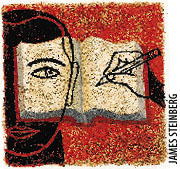 Publishing
Publishing
A New Openness
It’s a problem many Internet users share: How do you allow successive modifications of online materials without losing the credibility of the original?
By Brad Stenger
 A Brigham Young University grad student thinks he has a solution. David Wiley modeled his open publication license (OPL) on the agreements that allow open-source programmers to constantly and collectively improve free software. (In fact, open-source software gurus Richard Stallman and Eric Raymond helped him draft the license.) The OPL grants anybody permission to modify and redistribute the materials, provided changes are marked and the resultant work is also put out under the license. Wiley set up a repository for all OPL works at the OpenContent Web site (www.opencontent.org).
A Brigham Young University grad student thinks he has a solution. David Wiley modeled his open publication license (OPL) on the agreements that allow open-source programmers to constantly and collectively improve free software. (In fact, open-source software gurus Richard Stallman and Eric Raymond helped him draft the license.) The OPL grants anybody permission to modify and redistribute the materials, provided changes are marked and the resultant work is also put out under the license. Wiley set up a repository for all OPL works at the OpenContent Web site (www.opencontent.org).
As of July, the repository contained about 90 registered works, ranging from experimental art to university course materials. Wiley is working on a new OPL with an optional clause prohibiting commercial paper publication without the author’s consent. This way, a work could benefit from online peer-review and peer-improvement while a hard-copy version’s publisher would be protected from its competitors.
Mark Stone, an editor at O’Reilly & Associates, a California firm that is one of the leading publishers of material on programming and open-source software, says such crossover from the free-content community to the for-profit realm would be most valuable when the ideas are new and changing fast. Or, as Stone puts it: “where mindshare is more important than marketshare.”
Brad Stenger is a graduate student in computer science at Georgia Tech and an intern at Technology Review.
Links


